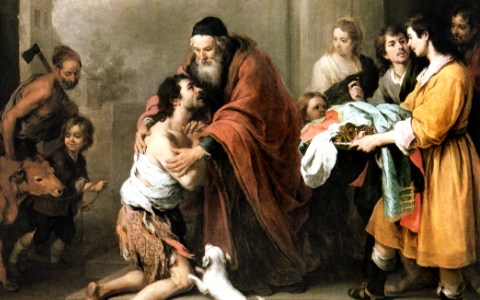
“The Return of the Prodigal Son” (detail) by Murillo
The exalted nature of forgiveness is attested to by the fact that it presupposes a number of other virtues. Consider three virtues in particular: justice, clemency, and mercy.
Justice has the nature of an equation: Borrowing 10 dollars requires returning 10 dollars. When justice is violated, punishment or restitution of some kind is required. Herein is the timeless significance of bringing the scales of justice back into balance. Injustice demands a counterbalancing repayment. Clemency goes beyond justice, to some extent ignoring the need for precise balancing, and reduces the payment. For example, clemency may be used to reduce a 60-day sentence to 15 days. Mercy goes beyond both justice and clemency to wipe away the need for punishment. It does not turn a blind eye to the offense committed, but it does pardon the offender.
Forgiveness goes beyond those three virtues, but without negating any of them. Justice, clemency, and mercy provide the very foundation that allows forgiveness to be a possibility. Forgiveness goes beyond mercy and treats the offense as if it never happened. It wipes the slate clean, as it were, and gives the transgressor a fresh start.
On the part of the person forgiven, the virtues of humility, sincerity, and hope are presupposed. In this way, forgiveness represents a truly exalted virtue because of the foundational virtues it presupposes in both the forgiver and the one forgiven.
Humanly Possible?
So exalted is forgiveness that it has long been described as supernatural. “To err is human, but to forgive is divine.” Or, to modify this timeless maxim slightly, “To err is human, but to forgive is superhuman.” By contrast, systems of justice are incapable of dispensing forgiveness. A sign posted in a Los Angeles police station brings this point home both accurately and humorously: “To err is human, to forgive is against departmental policy.”
Systems are not only incapable of forgiving, but are often vehemently opposed to it. A few years ago a successful businessman died whose name happens to be well-known to enthusiasts of baseball trivia. National newspapers that carried his obituary didn’t begin in the customary manner of mentioning his accomplishments or the members of his immediate family, but in the following manner: “Fred Snodgrass, whose muff of a fly ball cost the New York Giants the 1912 World Series . . .” Society remembers Fred Snodgrass, along with “Wrong Way” Corrigan and a populous class of similar individuals, solely in terms of a single, inexcusable, though often trivial, misadventure.
In order to be in a position to appreciate the reasonableness of forgiveness — and the accompanying horror of condemnation — one must stand on a platform built on its foundational virtues. It is comparable to a father lifting up his child so that the lad can see over the heads of the people in front of him to see the parade.
No Islands
The secular world has its penitentiaries, just as hockey has its penalty boxes and baseball scorecards have their error columns. The kind of forgiveness the world usually offers is of a bogus variety — that of forgiving yourself. This concept of self-forgiveness is, in part, the consequence of modern secular psychology that has inflated the importance of the individual as an individual. Popular self-help books such as How to Be Your Own Best Friend, Winning Through Intimidation, How to Get Divorced from Mom and Dad, and others, create the impression that the individual is an island unto himself.
But forgiving oneself implies a radical form of personal disunity. Can one divide oneself into two parts: the part that bestows forgiveness and the part that receives forgiveness? And how would the former part receive forgiveness or rise above the latter part to presuppose that it can dispense forgiveness? And along what lines (fault lines?) of the personality can such a division be made?
The essence of forgiveness concerns not individuals as such, but relationships. Forgiveness repairs a damaged relationship between man and God, as well as between man and neighbor. The two great commandments — to love God and to love neighbor — reiterated in the Lord’s Prayer, underscore this meaning of forgiveness.
Exalted and Mundane
In Peter Shaffer’s play, Amadeus, a demented Antonio Salieri, now an inmate of an insane asylum, rolls through the hallways in his wheelchair dispensing “forgiveness” to his fellow inmates for the “sin” of mediocrity. The Salieri character went mad precisely because he could not succeed, despite trying with all the power he could muster, to forgive himself for not being a composer equally talented as Mozart.
An individual cannot forgive himself anymore than soap can clean itself. Humility is the virtue we need to be ourselves. Forgiveness is the virtue we need in order to repair our relationships with others.
In the absence of forgiveness — or the presence of unrepaired relationships — the field is wide open for the unchecked spread of deadly vices. This is the theme of Friedrich Dürrenmatt’s most enduring play, Der Besuch der alten Dame (The Visit of the Old Woman). In the play, first staged in 1956, Claire Zachanassian, now a very wealthy woman, returns to the town that unjustly condemned her and drove her out 45 years earlier. Her unforgiving attitude hardens into hatred for all the townsfolk. Drawing on a huge amount of inheritance money, she exploits the greed of the people of Güllen, seduces them into murdering her principal defamer, and leaves town with the diabolical satisfaction that the collective guilt of the people will plague them for many years to come.
Here is the fundamental paradox of forgiveness: it is supernatural and presupposes many foundational virtues while it is also elementary and necessary in order for people to get along with each other. Forgiveness is both exalted and mundane. This paradox may seem easier to grasp when one realizes that God, exalted as He is, remains with us to guide us in our relationships with Him and our neighbors every step of the way.
Please post your comments and questions below.
If you appreciate our writing, please use both the Share and Recommend buttons to tell your family and friends about this article. Help us help others to integrate their faith throughout their daily life.
Thank you! – The Editors














